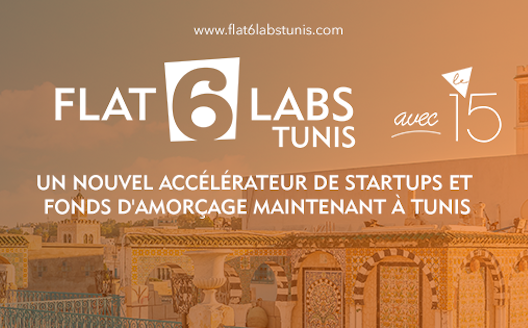Big changes for Tunisia as Flat6labs, Le15 launch

Last week Flat6labs announced their launch in Tunisia, alongside the brand new startup hub Le15, marking a huge leap forward for the country’s startup support.
The accelerator, which will call for applications in July and launch its first round in Autumn, will occupy the second floor of Le15 in 15 Carthage Avenue, downtown Tunis, which itself will open in September.

will host the accelerator Flat6labs.
The goal of director Zakaria Belkhoja is to have the ‘best in class’ on every floor.
The ground floor will host a local café and an exhibit area. The first floor will be dedicated to ideas through a coworking space. The second floor will be dedicated to turning ideas into projects and the third, with the help of Flat6labs, to funding.
Flat6labs Tunis will offer support to 75 Tunisian startups over five years through its two four-month acceleration cycles per year. Startups will receive seed funding between 80,000 to 100,000 Tunisian dinars (US$38,000 to $47,000) in cash and shared resources in return for 10-15 percent equity.
It will also offer follow-on and early stage investment tickets ranging from 200,000 to 600,000 dinars ($94,000 to $280,000) to the startups they accelerated as well as other startups that are too big for acceleration but too small for series A.
Flat6labs first announced their desire to make seed and Series A investments in Maghreb countries last March. With this presence on the ground in Tunis, they’re hoping to honor this announcement.
A type-A team
Launched in 2011 in Egypt, Flat6labs is also present in Jeddah, Abu Dhabi, and soon Beirut. Flat6labs is MENA’s only Global Network Accelerator (GAN) member, a network created by Techstars.
As for Le15, it’s a creation of Tunisian investment company Meninx Holding.
The two projects are supported and funded by the Tunisian-American Enterprise Fund (TAEF), and is one of the first initiatives by Tunisian bank BIAT as part of its strategy to support entrepreneurship in Tunisia that was kicked-off in the last few weeks.

The importance of place
“Having a physical place, it helps to structure the ecosystem, it helps also to attract the broader business community in the country,” Belkhoja told Wamda. “Le15 is a catalyzer, it will be an open house for the entire ecosystem. We will be happy to host as many initiatives as possible.”
Hany Al Sonbaty, cofounder of Flat6labs and managing partner of parent company Sawari Ventures, sees Le15 as a “physical manifestation of a movement”.
“Once you have that physical manifestation, evangelizing entrepreneurship, the power it can have, and spreading the word by pointing to a building is easier. I have no shadow of a doubt that more and more people will be drawn to our world. It happened to every country we’ve been to.”
The new space will also enable more collaboration between the different players of the ecosystem, one being that Flat6labs won’t commit to follow-on investment if no other investors from the community validate the model.
Having a building will also participate in spreading this will for change. “It’s about having some oxygen in the downtown. It’s at the heart of the city, it will change the urbanism, it will change the city, it will inspire, it will change everything,” he said.
It’s time for Tunisia
But are there enough startups in Tunisia to justify such a project?
Al Sonbaty laughs: “Absolutely!”
“The elements of success are there, the main issue is to create the environment where they come together,” he said. “They’re not the biggest country but they’re probably one of the best educated, one of the most open, and that is probably one of the biggest determinant of success if you want to build a company.”
Al Sonbaty said that every country they’d been in had its own unique characteristics. “Cairo has sheer massive numbers. Saudi’s consumer internet is like no other in the Arab world. The UAE can easily attract foreign entrepreneurs to come. Tunis is a very open society and that does wonders for the entrepreneurial ecosystems.”
Al Sonbaty said during the setup process he’d learned that Tunisia was a small country but to really understand its potential investors had to add Libya and Algeria and understand its relationship with the European market.
“Right now, they’re testing new institutions, and they’re working well. I definitely believe that they have a very good institutional framework that can help the country develop,” he said.
He’s also looking forward to interacting with the Tunisian diaspora, saying that an accelerator like Flat6labs was likely “one of the best platforms to enlist their support”.
Flat6labs’ program
Flat6labs Tunis’ program will be similar to those it runs elsewhere in the region, providing Tunisian entrepreneurs in innovation-and knowledge-driven industries assistance such as funding, mentorship and coworking space.
The program will start the flagship five-day bootcamp from which six to eight startups will be selected for one of the two acceleration cycles. The cycles will end with a demo day to help graduating startups receive follow-on funding from investors.
“Our ambitions is to have Flat6labs in all the mature Arab cities. We do it one city at a time,” Al Sonbaty said.
“We’re a bit late [in Tunis], it should have been earlier, right?” he laughed. “It takes time to cultivate the right partnerships and in the timeframe of what we want to do, what’s a year?”


